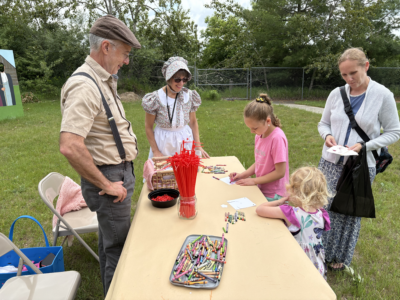Peer recovery coaches change lives in growing profession

News Photo by Julie Riddle Grayson Lewis, left, new peer recovery supports coordinator for Northern Michigan Substance Abuse Services, walks in Alpena with her predecessor at NMSAS, Tory Werth.
ALPENA — Battles are best fought by the side of someone who’s been there before, addiction recovery advocates say.
“If you break a leg, you want to talk to a friend who’s broken a leg, not someone who’s never broken a bone in their body,” said Grayson Lewis, the new peer recovery supports coordinator for Northern Michigan Substance Abuse Services, a Gaylord-based agency providing medical treatment and other recovery services for the Alpena area and other parts of northern Michigan.
As the coordinator of a network of paid and volunteer peer recovery coaches, Lewis connects people in recovery with the training and support they need to help other people weather the storms of addiction recovery.
Until a few years ago a nearly unknown role in Northeast Michigan, the position of peer recovery coach has gained traction in the area.
Alpena-area mental health and social service agencies and others eagerly hire coaches, people who have experienced addiction and been trained to counsel and speak for others in their recovery fight.
Peer recovery coaches are uniquely equipped to provide that help because they’ve been in those shoes themselves, Lewis said.
Using their own experiences to support others gives coaches a new sense of their worth, said Lewis, recounting her own journey from addiction to advocacy.
“From danger to society to social worker,” Lewis beamed, describing her new position on Monday. “It’s like a book title.”
When she was younger, Lewis adamantly rejected the idea of someday working as a drug or alcohol counselor.
The strictures of the early days of the COVID-19 pandemic made her reevaluate how she wanted to use what she’d learned from her fight against addiction.
“I did not live through all of that to be working at a factory making hats while the world was ending,” Lewis said.
Enrollment in peer recovery coach training at NMSAS took her from an hourly factory job to a salaried, from-home position with flex time, sharing lessons she’d learned with other people in recovery and “just letting them know they were not alone,” she said. “I feel like Cinderella.”
The relatively unknown position of peer recovery coach got a boost when the pandemic necessitated virtual trainings, said Tory Werth, NMSAS recovery supports coordinator before Lewis.
Now, he said, “they are becoming an integral part of our communities” as agencies realize the value of coaches’ experience and work paid coach positions into their budgets.
Many people who become coaches “never thought they would be able to be an asset as a result of the stuff they had to go through,” Werth said.
People who have come through addiction often carry the scars of a criminal background, homelessness, domestic violence, or other trauma that could stand between them and a more traditional job.
Peer recovery coaching, increasingly viable as a profession, makes the most of such experiences, Lewis said.
“It expects some darkness,” she said. “It redeems those negative experiences and makes them aspects in a career.”
In Northeast Michigan, peer recovery coaches have been integrated into family-focused recovery support groups, hospital emergency rooms, and police, mental health, and social service agency programs.
NMSAS’s thrice-yearly recovery coach training programs are bursting at the seams, with more applicants every year, Lewis said.
Newly in charge of those trainings, she is excited about the word of mouth that keeps potential coaches knocking at NMSAS’s door.
She’s even more excited about what peer recovery coaching can do for both those receiving coaching and those offering it.
“For people in recovery who don’t know what to do with their lives, who feel they’ve ruined all their chances by their actions,” Lewis said, “for them to find purpose and meaning, to be able to go from living a life of active addiction to not only being in recovery but also helping other people into recovery — it’s gorgeous.”
Julie Riddle can be reached at 989-358-5693 or jriddle@thealpenanews.com. Follow her on Twitter @jriddleX.
To become a coach
To learn about peer recovery coaching, or to apply to enroll in an upcoming recovery coach academy, visit youpickrecovery.org. The next recovery coach academy through Northern Michigan Substance Abuse Services begins July 23. Space is limited and participation requires a background check and interview.
To join a NMSAS “Virtually Inspired Recovery” open online discussion for anyone interested in addiction recovery, join with Zoom ID 871 5113 7138 and password 862320. Hour-long discussions are held Tuesdays and Thursdays at noon. Contact Grayson Lewis with questions at glewis@nmsas.org.



